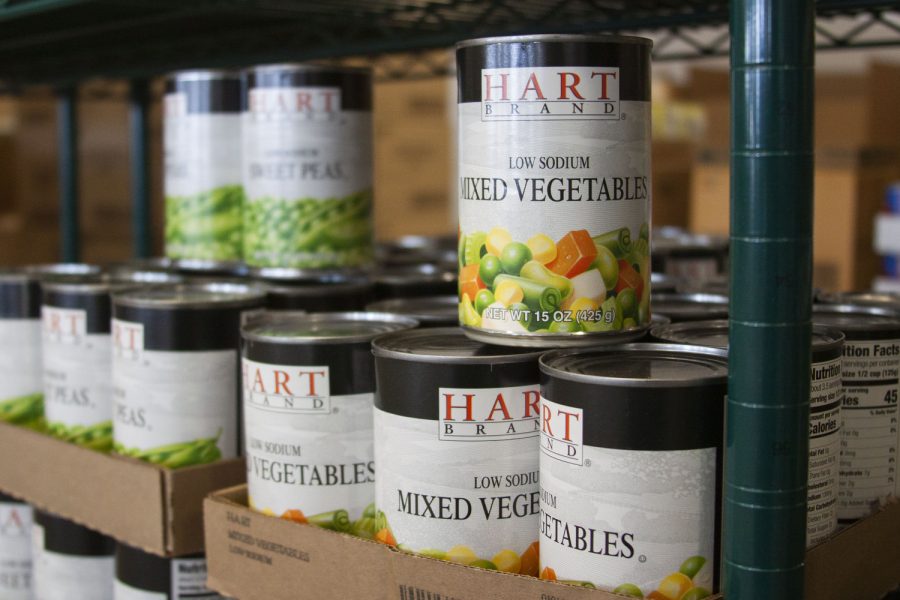Iowa City citizens, organizations concerned about food assistance cuts
House File 3, a proposed bill that focuses on reducing benefits and increasing food and health assistance restrictions, is making local food banks worried for the future.
Food donations are seen inside of the CommUnity Crisis Services and Food Bank in Iowa City on Feb. 14, 2022. The center is a volunteer-driven organization for grocery assistance.
Kufre Ituk, News Reporter
February 7, 2023
People who are eligible for the Supplemental Nutritional Assistance Program in Iowa City may have fewer food options to choose from in the future.
A proposed bill in the Iowa legislature, House File 3, would reduce benefits and increase restrictions for those who receive government food and health assistance in the state. The legislation was introduced in the Iowa House on Jan. 11 and is currently in committee deliberation.
The two assistance programs primarily targeted are SNAP and Medicaid. SNAP is federally funded and operated at the state level, while Medicaid is funded by local, state, and federal government.
Adrianne Korbakes, Iowa City CommUnity Crisis Services and Food Bank chief operating officer, said with the cost of food increasing and with the possible bill, local food banks will feel strained to meet the needs of its customers.
The food bank saw a 30 percent increase in the number of new households that are coming to its food pantry, Korbakes said.
“We’re seeing that working families and individuals like seniors who are on a fixed income are already struggling as the cost of food is increasing,” Korbakes said. “A bill like this creates more barriers for people to get food.”
The restrictions originally proposed in HF 3 included limiting the types of food a person can receive with SNAP such as fresh meat, white grains, and snack items. Now, the limited items are soda and candy, but the bill also includes asset limits, identity verification, mandatory work requirements, and employment and training programs.
The bill also suggests a limit on the assets a family can possess to maintain SNAP benefits. The limit is $2,250, with a $4,250 limit for those that have a person with a disability or an individual over 60 years old in the household. Households with more than one vehicle would also be reevaluated for the program.
RELATED: Bill to change SNAP benefits moves to committee vote
Aislinn Conrad, a research fellow at the University of Iowa’s Social and Education Policy Research Program and assistant professor in the school of social work, said the overall goal of the state should be to help children and families succeed.
“I think about the push for college education funding; we want kids to succeed in school. Often what would go in those categories of assets would be things like cars and savings accounts that might be helping kids go to school,” Conrad said.
Conrad said these new legislative measures will most heavily affect SNAP recipients with children.
“Nearly 70 percent of people who get SNAP have children. People with kids tend to be poorer and have more stress because they have more stressors on their income,” Conrad said. “The people who are hurt and are typically hurt by cuts to SNAP and cuts to anything that involves resources at the federal level [are] typically families.”
Conrad said federal assistance programs often help with poverty and financial insecurity. Decreasing benefits offered could have adverse effects, she said.
“There’s been a lot of research that ties programs like SNAP to actually lifting people out of poverty, decreasing their food insecurity and hunger, and increasing medical care access because those are all very expensive things for families,” Conrad said. “By cutting those, it will probably force more families to make really hard choices between food and other things that they may need. There’s just a lot of poor health outcomes that come out of that.”
If the bill is passed, it will go against the goal of helping families that are in need improve themselves, she said.
“The question is if we’re wanting people to be self-sufficient, if we’re wanting families to be on their feet to succeed without intervention; if we have this restrictive thing, it actually goes against the idea,” Conrad said. “We really have to ask ourselves, ‘Is this going in line with our values, or is it going against our values of helping families?’”



